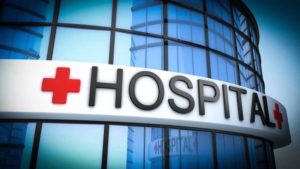
“I don’t like hospitals,” my friend says and I get the message that he’s not going to visit one of our mutual friends during his stay there. I hear this negative comment about hospitals often, in spite of the popularity of televised hospital drama shows such as MASH, Grey’s Anatomy, ER and the longest running soap opera, General Hospital. Apparently we’re fascinated by the stories of the staff and patients but we want to view them from the comfort of our living room lounge chairs.
My recent four day hospital stay involved reminders and “visitations” with many long dead relatives, which made me wonder if that’s why people might not like hospitals – too many déjà vu experiences of friends and relatives’ illnesses, or of some of our own.
According to the American Hospital Association there are 5,564 hospitals in the US employing 7 million people, so hospitals are the worksites for a significant number of workers in America. My mother nurse Jane was one of them. In spite of my father’s early promise that “no wife of mine will ever work,” in between and around having six kids, Mom worked the night shift in various hospitals in our hometown, usually in labor and delivery departments. Having mom on your health care team made for the best birthing experience ever according to my friends that experienced her in that role. Having a health care professional in the family was a lifetime assess when medical issues raised their ugly head. Mom was a translator and a cool head. Even today, my mother long gone, I find myself asking, ”What would Mother do.”
Visiting mom at work when we were teenagers and able to drive there gave my sisters and I access to a calm and confident in-charge professional women who listened carefully and helped us problem solve whatever issue we brought to her in that setting. Needless to say, we could not access that woman at our house, she was too busy trying to manage the care and transporting of off-spring or hold up in her bedroom trying to catch some sleep before her night shift that began at 11pm.
As I walked the hospital’s circular hallways as directed, five times a day while pushing an infusion pole I thought of the time I spent trying to keep up with my physical therapist daughter Corinne as she pushed her infusion pole through hospital corridors, multiple times a day for two weeks while getting a bone marrow transplant. A dozen years ago, the corridors weren’t so crowded with charting carts, medical equipment, cleaning buckets, and food carts. Steering to avoid obstacles takes quite a bit of skill, especially while maneuvering to make sure those hospital-supplied outfits don’t fly open in the back. Yes, they still make you wear those dreadful gowns. They are more colorful now, but like the wheel chairs, 3 times larger to accommodate larger people, and they’ve gotten rid of the smaller versions for small or regular-sized people.
Surgeons save 500,000 lives a year, but they do it with the help of 27 different health professionals that the average surgery patient sees during their hospital stay. Though I didn’t count them, I’m sure I saw close to that many. One of your most important jobs in recovering from surgery is keeping your lungs inflated and functioning. The repertory therapist brought two variations of plastic breathing apparatus and demonstrated how to use them. She recommended repeatedly blowing into them 10 times an hour. I recognized the one with numbers to aim for on it from my son Kenneth’s treatment regime for preventing pneumocystis pneumonia (pcp) during the years he was living with AIDS.
Even the food tray reminded me of a beloved relative when I saw the Ensure label on a liquid drink. Aunt Dote lived on that product for the last few years of her life. She was grateful when her doctor found it since many foods were so hard for her system to handle. This gave her respite from what had been a life long struggle to nourish herself with food.
The modern hospital is not a place for a leisurely visit, the patient has too much work to do, though I loved the visit from a singer friend who lead me through some vocal exercises that helped me rehab my breathing better than the plastic breathing machines. Hospitals are not a place for rest, too many interruptions for monitoring and treatments. As long as you don’t expect rest, and you’re willing to carry out the jobs you’re given to accomplish your recovery, you can get home quickly to the comfort of your own bed, home made soup, and in my case, the warmth of a gas fireplace for the cold nights ahead.
Sheila

